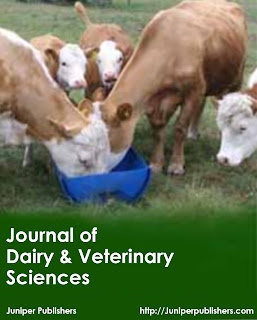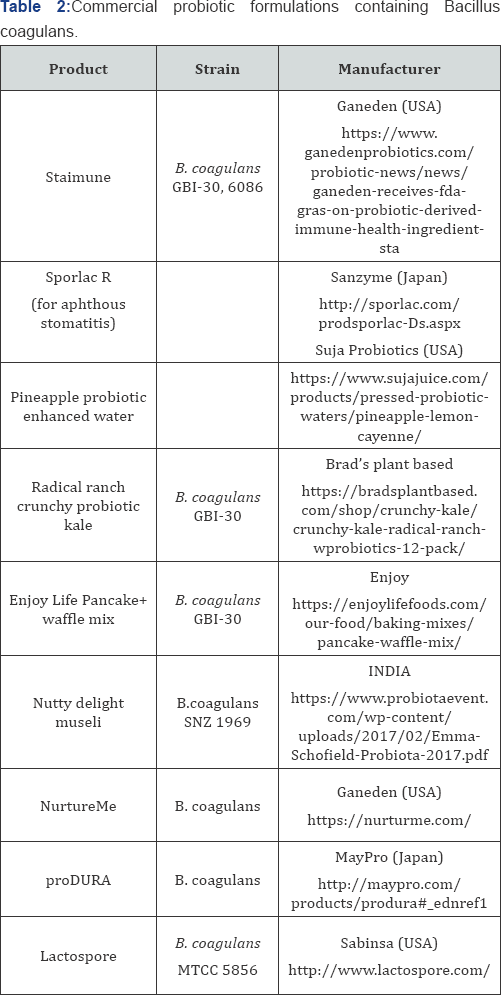Mini Review on the Dynamic Probiotic-Bacillus coagulans-Juniper Publishers
Journal of Dairy & Veterinary Sciences- Juniper Publishers

Introduction
Health benefits imparted by probitoics and their
roles in maintaining health and disease prevention has been an area of
extensive research in the past few decades. Some of the commonly used
probiotics include Lactobacillus rhamnosus, L. reuteri, Bacillus coagulans, E. coli Nissle 1917, some enterococci and yeasts like Saccharomyces boulardii etc. Pandey et al. [1]
have reviewed the major health benefits (and their probable mechanisms
of action) ranging from diarrhea to cancer prevention etc. One of the
nastiest technological problems probiotic fermentation industries face
is loss of viable cell count during harsh processing conditions. Spore
forming Bacillus probiotics remain in huge demand due to their ability
to withstand the stringent processing conditions. One of the sturdiest
probiotics is B. coagulans
Bacillus coagulans
Bacillus coagulans (discovered in 1930) was formerly known as Lactobacillus sporogenes. B. coagulans is a spore forming non-pathogenic gram positive bacteria that produces L(+) lactic acid homofermentatively. B. coagulans
is a remarkably resilient probiotic that is able to withstand extreme
conditions (like high temperatures, processing, stomach acids and bile)
and is room temperature-stable for up to 3 years. Sporulation property
makes B. coagulans the favorite of commercial probiotic producers. Various preparations of B. coagulans
in powder, tablet and capsule forms exist in the market imparting
several health benefits on the hosts like treatment of prevention of
some diseased conditions (some are enlisted in Table 1).

Global Probitoic Market
The penetration of probiotics in the market is very
high. Probiotic foods are available in grocery stores and supermarkets,
while probiotic supplements are available in pharmacies and health food
shops. Moreover, the increasing obsession of digestive wellbeing and
preventive healthcare has accelerated the market growth. There is
increase in number of probiotic ingredient suppliers who develop
tailored strains of microorganisms for integrating with a diverse set of
probiotics products.
Dynamic Probiotic for Commercial Producers
The probiotic ingredients market is segmented on the
basis of application into food & beverage (dairy, bakery &
confectionery, meat & cereals, etc), dietary supplements, and animal
feed. The global probiotic market is dominated by players likeYakult
(Japan), Dupont (Danisco), Ganeden (USA), Sabinsa (USA), BioGaia
(Sweden), Nestle (Switzerland) etc. Asia-Pacific is the largest market
for probiotic products and ingredients with Japan having accounted for a
major share. The dietary supplement segment is projected to grow at the
highest CAGR of 8.0% from 2015 to 2020. Health effects exerted by any
probiotic is strain specific. Some of the commercial formulations
containing B. coagulans strains have been enlisted below Table 2.

Conclusions
B. coagulans strains need a further
characterization to rule out the speculations like causative agent for
infections in patients with catheters and leading to rejections in organ
transplants etc. Another lacunae in B. coagulans research is
lack of large scale human trials and uncertainty of dosage amounts due
to scanty clinical data. There is a need to evaluate the survival of B. coagulans during manufacturing process and storage conditions [2-12].
To know more about journal of veterinary science impact factor: https://juniperpublishers.com/jdvs/index.php
To know more about Open Access Publishers: Juniper Publishers



Comments
Post a Comment